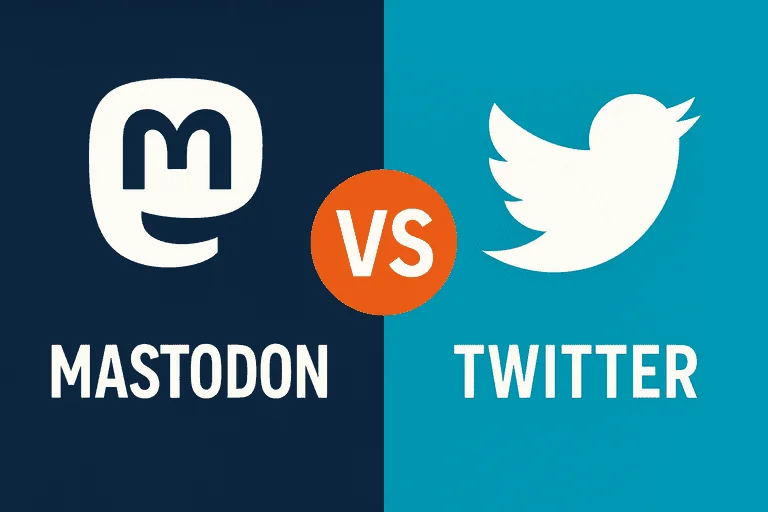Introduction
Twitter has long dominated the world of microblogging and online conversation. But concerns around algorithmic control, surveillance, bans, and the ownership of platforms have led to a surge in interest for decentralized alternatives. Mastodon, a federated, open-source platform, is leading that shift.
In this article, we compare Mastodon vs Twitter—from philosophy to functionality—to help you decide whether decentralized social media fits your goals. We’ll break it down for both beginners and advanced users, covering real-world use cases and technical insights.
1. Platform Philosophy: Centralized vs Federated
| Feature | Mastodon | |
|---|---|---|
| Ownership | Single company (X Corp/Elon Musk) | Federated servers (independent hosts) |
| Moderation | Centralized policies | Server-specific moderation |
| Algorithmic Feed | Yes (heavily curated) | No (chronological by default) |
| Ads/Tracking | Yes | No |
| Business Model | Ads, subscriptions | Community-supported (donations, etc.) |
Key takeaway: Mastodon puts you in control. You choose or run your own server, define your rules, and aren’t subject to sudden policy changes.
2. How Mastodon Works (For Beginners)
Mastodon is part of the Fediverse—a network of independently hosted servers that talk to each other. Each Mastodon server (also called an “instance”) is like a community with its own rules and culture.
- You can follow people from any instance.
- You own your data and can migrate your profile.
- Posts are called “toots” (though this term is phasing out).
Beginner Tip: Sign up on a general-purpose instance like mastodon.social or joinmastodon.org to start. Later, you can move to a niche or private server.
3. User Experience Comparison
| Feature | Mastodon | |
| Character limit | 280 characters | 500+ characters (varies by server) |
| Post visibility | Public, followers, private | Same, plus unlisted |
| Media attachments | Images, video, GIFs | Yes, with alt text support |
| Hashtags & trends | Curated, algorithm-driven | Hashtags only, no trends |
| Search | Full-text, hashtags, users | Limited to hashtags & users |
| Verification | Twitter Blue badge | Domain-based profile verification |
Pro: Mastodon’s UX is less noisy—no ads, trending tab, or viral spam. You see what you follow.
4. Privacy & Data Ownership
- Twitter collects behavioral data, location, and device info. Content is stored and monetized.
- Mastodon stores your data on the server you choose. Admins can view some metadata, but tracking is minimal. No personalized ads.
Advanced Users: You can host your own instance and fully own the infrastructure and data.
5. Community & Culture
Mastodon’s community skews toward:
- Open-source developers
- Privacy advocates
- Academics, artists, journalists
You’ll find a calmer, slower-paced experience. No quote tweets (which reduce pile-ons), and content warnings (CW) are widely used for sensitive topics.
Warning: Culture shock is real. What gets likes on Twitter might fall flat on Mastodon. Read the room.
6. Setup & Hosting (Advanced)
Want full control? You can self-host Mastodon. Here’s what you need:
- Requirements: Ubuntu server, PostgreSQL, Redis, Sidekiq, nginx
- Domain: For your instance (e.g. social.selfhosthero.com)
- Email server: Needed for signups and notifications
- Storage: For user uploads, media, backups
Tip: Use containers (Docker) or opt for managed hosting (e.g. masto.host) if you want less hassle.
7. Drawbacks of Mastodon
- Learning curve: Federation, instances, and discoverability can confuse new users
- Missing features: No native quote tweets, trends, or algorithmic recommendations
- Fragmentation: Conversations happen across multiple servers
Yet, for many, the benefits outweigh the friction.
8. Who Should Consider Mastodon?
For beginners:
- Wanting a calmer, ad-free social media
- Interested in open-source and ethical tech
- Tired of algorithm manipulation
For techies:
- Want to self-host their digital identity
- Want complete data ownership
- Eager to explore the Fediverse (Mastodon, PeerTube, Pixelfed, etc.)
Transition tip: Use cross-posting tools or add Mastodon to your social stack without quitting Twitter cold turkey.
9. Conclusion: The Future is Federated
Mastodon isn’t just a Twitter clone—it’s a philosophical shift. It challenges the norms of algorithm-driven engagement and platform dependency. While it may not be for everyone today, it offers a real alternative that puts people over profit.
Explore it. Experiment with it. And if you’re building a privacy-first digital presence, Mastodon might just be the missing link.

